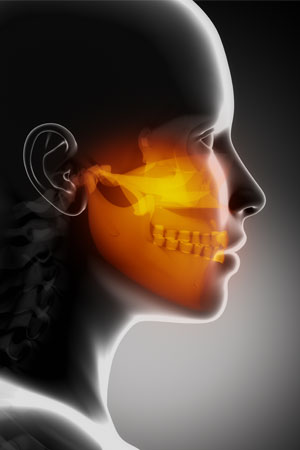
TMJ
 Disorders of the jaw, or temporomandibular joint (TMJ), are fairly common. This joint is one of the most complex in the body, with multiple components that need to move in concert so that the jaw can move vertically and laterally. Even a minor glitch that affects one portion of the jaw can lead to major discomfort.
Disorders of the jaw, or temporomandibular joint (TMJ), are fairly common. This joint is one of the most complex in the body, with multiple components that need to move in concert so that the jaw can move vertically and laterally. Even a minor glitch that affects one portion of the jaw can lead to major discomfort.
Jaw and facial pain are the hallmarks of TMJ disorders, but other symptoms may indicate that you have this condition, as well. Clicking or popping sounds during chewing, episodes of the jaw locking and even earaches can be signals of a TMJ disorder.
TMJ disorders may develop following an injury to the jaw, or they can arise due to a congenital defect in the jaw.
Patients often consult with an oral surgeon for TMJ treatment, but that treatment may not be invasive in nature. Before oral surgery, your oral surgeon will begin with a thorough examination of your jaw, including x-rays that allow the oral surgeon to observe how the bone structures fit together.
After the oral surgeon has determined which part of the jaw is causing your discomfort, he or she will then move forward with developing a treatment plan.
If the muscles appear to be at fault, conservative measures like pain management with over-the-counter medications or massage or physical therapy may resolve the patient’s symptoms. Stress can contribute to the problem, so stress management techniques may also bring the patient some relief. Some patients also respond well to wearing a splint or bite guard.
Jaw and facial pain are the hallmarks of TMJ disorders, but other symptoms include clicking or popping sounds during chewing, episodes of the jaw locking and even earaches.
However, if the joint itself is damaged, the patient may need to undergo surgery to repair that damage. Similarly, if a patient fails to see improvement with more conservative approaches, surgery likely is indicated. An oral surgeon can use any number of techniques to address TMJ disorder, including arthroscopy or disc replacement, if necessary.
If you have been suffering with jaw pain that may be related to a TMJ disorder, schedule an appointment with one of our oral surgeons to discuss your treatment options. You may be able to get relief from your symptoms.

